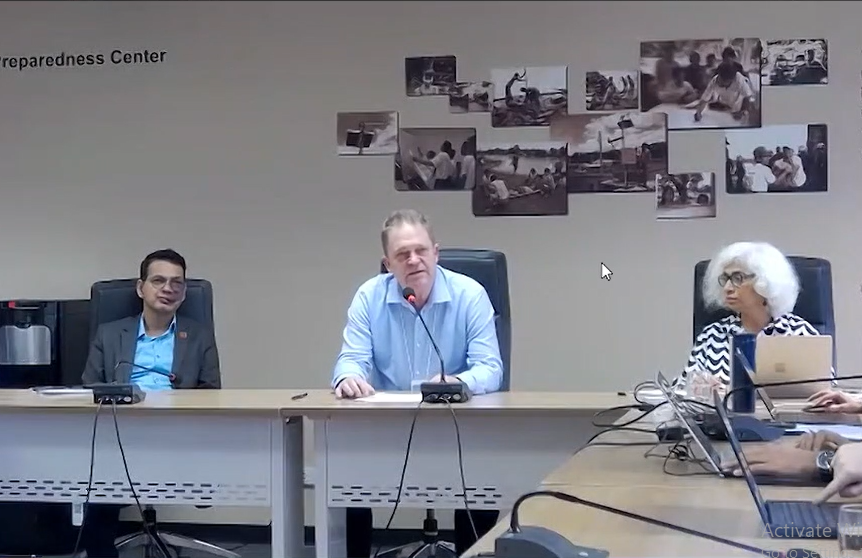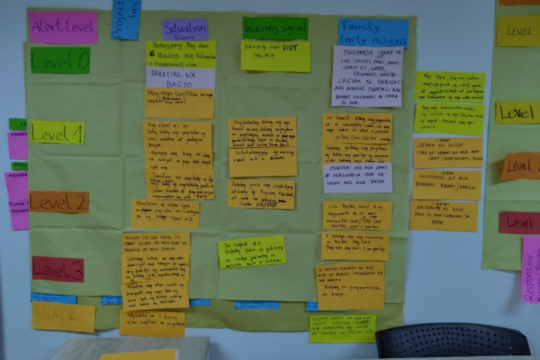On July 30, 2024, the Asian Disaster Preparedness Center (ADPC) in Bangkok witnessed a historic milestone with the official launch of the Asian Disaster Readiness Fund (ADRF). This landmark event, attended by distinguished guests, partners, and participants from around the globe, marks a significant step forward in enhancing disaster risk reduction and preparedness at the local level.
Bridging Gaps in Disaster Preparedness
The ADRF was established under the Asian Preparedness Partnership (APP) to tackle crucial gaps in disaster preparedness and response, especially at the grassroots level. The fund aims to empower local actors, improve risk anticipation, enhance emergency responses, and facilitate recovery through a collaborative approach. The initial financial and technical support for this initiative is generously provided by the Bill & Melinda Gates Foundation.

Executive Director of ADPC, Mr. Hans Guttman, described the ADRF launch as a “landmark journey” dedicated to bridging the significant gaps in disaster recovery opportunities. He emphasized the fund’s focus on empowering local actors, which will enhance their capabilities and foster community resilience. “This fund aims to ensure that communities can recover and thrive, even in the face of adversity,” Mr. Guttman stated in his inspiring address.
A Unified Vision for Local Empowerment
The launch event was marked by a series of insightful speeches and presentations from key figures in the disaster preparedness community.
Major General (Retd) Udaya Herath, Director General of the Disaster Management Centre (DMC), Sri Lanka and 2024 Co-Chair of APP, officially inaugurated the ADRF. He emphasized the importance of this initiative as a critical moment for advancing disaster preparedness and response in the region. Major General Herath expressed heartfelt gratitude to ADPC and the Gates Foundation for their unwavering support. The details on the ADRF can be found on https://app.adpc.net/.
Voices from the Countries
Representatives from Asian countries shared their perspectives on the importance of accessible funding for disaster resilience. H.E Prak Kim Hong, Deputy Secretary General, NCDM, Cambodia highlighted the need to empower local stakeholders to drive community resilience and preparedness. Dr. Bhishma Kumar Bhusal, Joint Secretary, MoHA, Nepal emphasized the crucial role of ADRF funding in bolstering local disaster preparedness and response efforts.
Asec Bernardo Rafaelito R. Alejandro, OCD, Philippines stated that, “The Philippines is adopting a holistic approach by integrating government efforts with other stakeholders to drive impactful, locally-led development. This strategy, supported by ready funding, empowers communities to leverage their own expertise while collaborating with external experts, encouraging them to take full ownership of their initiatives.’’
Dr. Janaka Hemathilaka, Executive Director, Janathakshan, Sri Lanka provided a compelling narrative on the challenges faced by his country. With severe impacts from floods, landslides, and cyclones costing the nation over 50 billion LKR annually, Dr. Hemathilaka stressed the necessity for accessible funding aimed directly at local actors. “The ADRF represents a vital opportunity to address the funding gap and empower local actors,” he said.
Executive Director from CHIAS, Lao PDR, Mr. Viengakhone Souriyo, emphasized the crucial role of accessible funding in strengthening local resilience and said we look forward to supporting and working with the ADRF. The event also featured discussions on the need for a holistic approach to disaster management.
Mr. Muhammad Razi, Director Policy, NDMA, Pakistan underscored the importance of comprehensive strategies involving government, civil society, advocacy, and the private sector. He highlighted that accessible funding for locally led development is crucial for creating lasting impact and strengthening community partnerships.

Empowering Resilience: ADRF’s 2024 Funding Focus
Dr. Valerie Bemo, Deputy Director of Global Development at the Bill & Melinda Gates Foundation, expressed her enthusiasm for the ADRF’s potential. She encouraged countries to explore domestic resources and anticipated a robust flow of proposals. “I look forward to seeing an overwhelming number of proposals, which would be a testament to the ADRF’s success,” Dr. Bemo said.

Ms. Shalini Khanwar, Program Lead for Localization provided an overview of the first funding cycle for 2024 under the ADRF, with a total allocation of $100,000 per country for one year. This funding will support four key thematic areas: strengthening local early warning systems, enhancing multi-hazard contingency planning, integrating climate risks and community based adaptation, and enhancing community resilience through CBDRM. The overall application process including the timeline, review and selection of the proposals were also presented. More information on the call for proposals under the ADRF can be found under https://app.adpc.net/adrf-proposals/.

Moving Forward: ADRF and the Next Steps
Ms. Pilar Pacheco, Senior Program Officer from the Gates Foundation, reflected on the importance of the ADRF for promoting localization and the maturity of the Asian Preparedness Partnership.
Mr. Asith De Silva, the newly appointed Chairperson of the ADRF Committee, concluded the event emphasizing on the importance of inclusivity, governance, and community-based disaster reduction management.
The APP Secretariat invited member countries to submit proposals for the current funding cycle under the ADRF, focusing on the thematic areas proposed.
A Call to Action
The launch of the Asian Disaster Readiness Fund represents a unified effort to support and empower the government, local NGOs, CSOs, the private sector, academia, and other local actors in building resilience and fostering regional cooperation. Together, we have the opportunity to champion accessible funding and strengthen the role of local heroes in disaster management.
As we move forward, let us continue to work together to create a safer and more resilient future for all. The ADRF is not just a fund; it is a commitment to building stronger communities and ensuring that no one is left behind in the face of disaster. By empowering local actors and supporting grassroots initiatives, we can turn the tide on preparedness for response and recovery, making a lasting impact across Asia and beyond.


